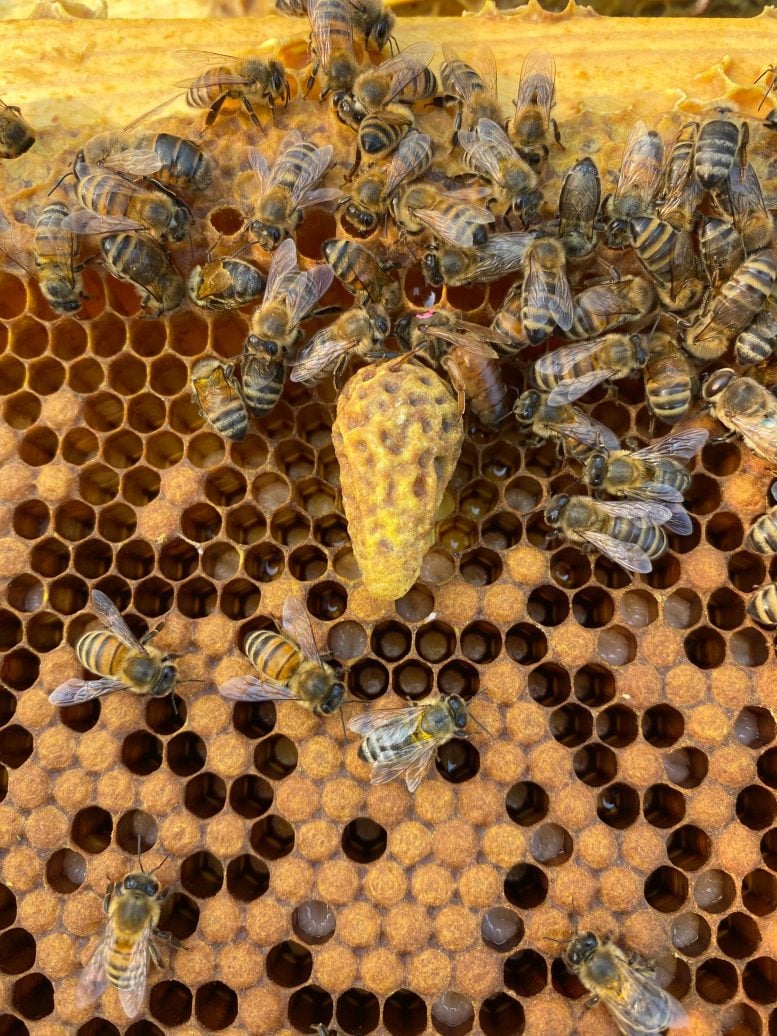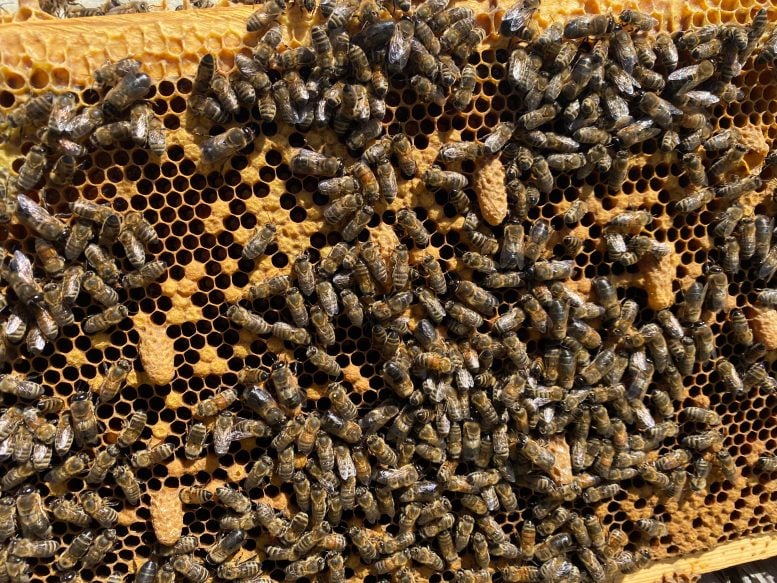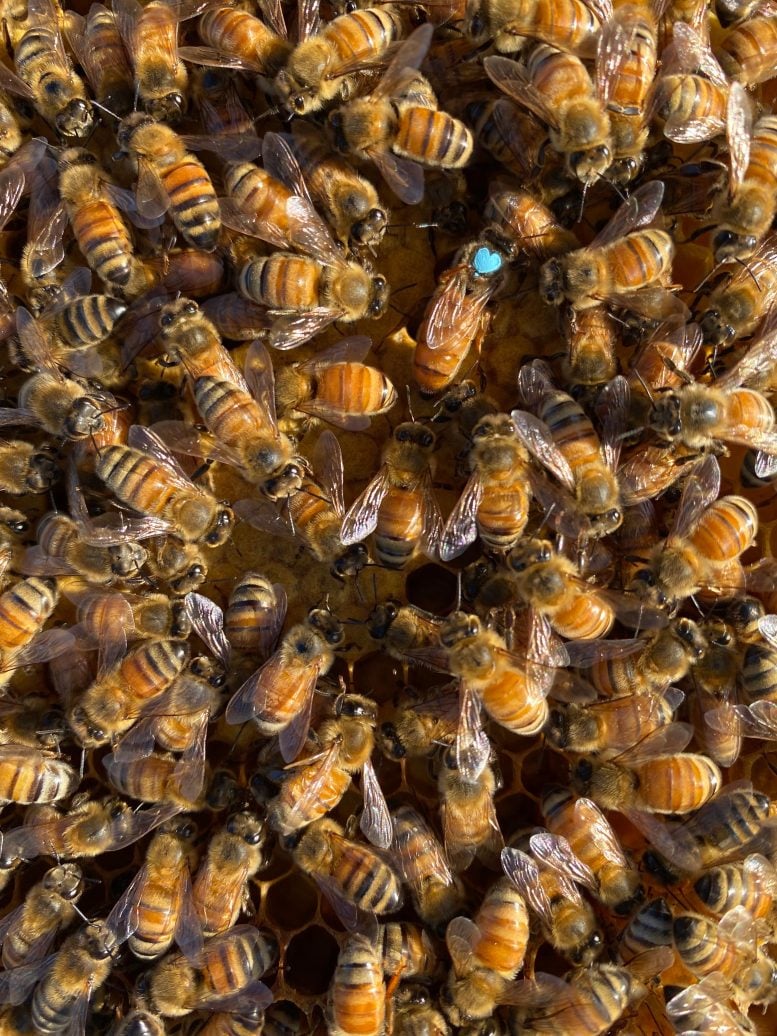
Posted on 11/21/2025 7:23:50 AM PST by Red Badger

Queen bee standing on a supersedure cell (peanut-shaped structure, center). Within the supersedure cell is a new queen bee that the workers have reared as a replacement. Credit: Shelley Hoover
============================================================================
New research reveals how viral infections in queen bees disturb colony stability and pinpoints a specific pheromone that may help preserve unity and productivity within hives.
It may sound like the plot of a medieval drama: a once-powerful ruler, weakened by illness, is overthrown by her own followers. In honey bee colonies, however, such dramatic power shifts are real—and they happen frequently, carrying both benefits and risks for the bees and the ecosystems that rely on them.
The process, known as supersedure, occurs when the thousands of worker bees in a colony detect that their queen is no longer laying enough eggs. In response, they work together to replace her with a younger, healthier queen. While this adaptation helps wild colonies survive, it can disrupt managed hives, creating pauses in egg-laying, smaller colony populations, and ultimately lower honey and pollination yields.
Researchers at the University of British Columbia have now uncovered new insights into what triggers these coordinated uprisings and how worker bees organize them with such precision.
How viral infections weaken queens
In a recent study published in PNAS, the research team discovered that common viral infections cause a queen’s ovaries to shrink, reducing her ability to lay eggs and to produce methyl oleate, a pheromone that normally maintains worker loyalty. When levels of this pheromone drop, the workers can detect the queen’s decline and begin preparing a replacement.
“A healthy queen can lay as many as 850 to 3,200 eggs per day, which is more than her whole body weight,” said senior author Dr. Leonard Foster, a professor of biochemistry and molecular biology at UBC’s Faculty of Medicine and Michael Smith Laboratories. “But in our experiments, virus-infected queens laid fewer eggs and produced less methyl oleate. That pheromone reduction seems to be the signal to workers that a queen is no longer fit to continue.”

Several supersedure cells on a honey bee frame indicate that the worker bees are rearing replacement queens. Credit: Shelley Hoover
Bees pollinate about one-third of the world’s crops, making them essential to healthy food systems, food security, and the health of people and communities worldwide.
Impacts on beekeeping and food systems
Beekeepers have been reporting problems with queen failure and premature supersedure for many years, with recent surveys identifying “poor queens” as the most frequently reported cause of overwintering losses.
The research highlights how viral infections are a driving factor behind these challenges, disrupting the delicate balance of chemical signals that maintain order in a hive.
Importantly, the findings also point to a practical way for beekeepers to intervene and manage supersedure. In proof-of-concept field trials, colonies given synthetic pheromone blends that included methyl oleate were much less likely to rear new queens compared to colonies that received blends without it.
“That could be a big deal for beekeepers,” said Dr. Foster. “Supersedure can be disruptive and costly, but supplementing colonies with methyl oleate could help stabilize hives during periods when continuous productivity is most important.”
The findings open the door to new management strategies for commercial beekeepers dealing with viral outbreaks, especially during periods of peak pollination or honey production to prevent untimely queen loss.
The hidden threat of varroa mites
“Our research really emphasizes how virus infections in queens can be a major problem for beekeepers,” said first author Dr. Alison McAfee, a research associate at UBC’s Michael Smith Laboratories and North Carolina State University. “Previous studies showed that failing queens were heavily infected with viruses, and now we know that those infections can lead to supersedure, which is risky for the colony and expensive for beekeepers to manage.”
 Queen honey bee marked with a blue heart. Credit: Shelley Hoover
Queen honey bee marked with a blue heart. Credit: Shelley Hoover
The research also highlights the role of varroa mites — parasitic pests that can spread the viruses linked to queen failure — underscoring the importance of keeping colonies healthy and parasite-free.
Queen infections are so far an underappreciated problem, said Dr. McAfee, who hopes that this research will change that.
“Keeping the queen healthy is one more reason why it is so critical to think ahead and keep varroa levels under control,” Dr. McAfee added. “There is currently no treatment for viruses in honey bee colonies, but now that we better understand their impact, we can change the way we manage varroa to give the queen a better chance.”
Reference:
“Elevated virus infection of honey bee queens reduces methyl oleate production and destabilizes colony-level social structure”
by Alison McAfee, Abigail Chapman, Armando Alcazar Magaña, Katie E. Marshall, Shelley E. Hoover, David R. Tarpy and Leonard J. Foster, 14 October 2025, Proceedings of the National Academy of Sciences.
DOI: 10.1073/pnas.2518975122

|
Click here: to donate by Credit Card Or here: to donate by PayPal Or by mail to: Free Republic, LLC - PO Box 9771 - Fresno, CA 93794 Thank you very much and God bless you. |
I loved being a beekeeper. It was a real passion of mine.
Alas, I cannot do that where I live today.
When you smell like an old person, nobody seems to like you anymore.
Disclaimer: Opinions posted on Free Republic are those of the individual posters and do not necessarily represent the opinion of Free Republic or its management. All materials posted herein are protected by copyright law and the exemption for fair use of copyrighted works.